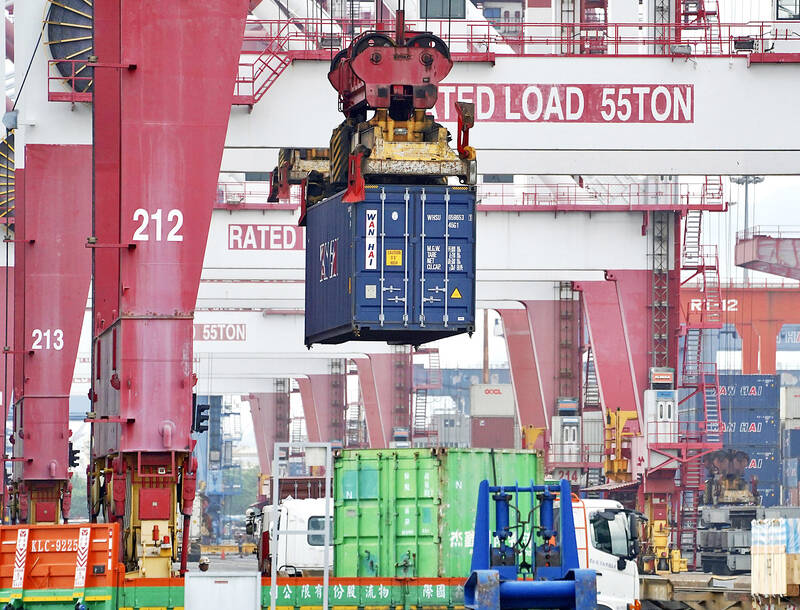Exports last month gained 3.4 percent to US$38.81 billion, ending 12 straight months of decline, thanks to strong demand for technology products related to artificial intelligence (AI), the Ministry of Finance said yesterday.
The release of new-generation consumer electronic products, notably smartphones, and a low comparison base from the same period last year helped boost exports, Department of Statistics Director-General Beatrice Tsai (蔡美娜) said.
“It is safe to say that exports are coming out of the woods” following a year of inventory adjustments, Tsai told a news briefing.

Photo: CNA
The crucial economic bellwether might lead to no or a minor contraction this month, while helping to stage a healthy recovery in the coming months, she said.
Nevertheless, shipments of electronics, primarily chips, shrank 4.3 percent year-on-year, but should return to positive territory next month, she added.
An earnings conference next week by Taiwan Semiconductor Manufacturing Co (台積電) — which counts Apple Inc, Nvidia Corp, Intel Corp, Advanced Micro Devices and other technology giants among its customers — would shed more light on the state of the industry, Tsai said.
Shipments of information and communication technology (ICT) products surged 59.8 percent to a record US$8.26 billion, underpinning the turnaround in exports and making up 17 percent of overall exports, she said.
Demand for AI-related products accounted for double-digit percentage increases in shipments bound for the US and Europe, where technology firms are aggressively developing and building up AI equipment and solutions despite stubborn inflation, the ministry said.
Shipments to ASEAN markets soared 24.8 percent to US$7.48 billion, making the bloc Taiwan’s second-largest export destination, aided by robust demand for electronics and ICT products, Tsai said, adding that a global supply chain realignment also contributed to the rise.
Exports to China fell 8.8 percent, easing to a single-digit percentage for the first time in 14 months, a positive sign, she said.
Non-tech products also benefited, with exports of chemical and mineral products rising 10.3 percent and 0.9 percent respectively on the back of inventory restocking demand and higher international oil prices, she said.
By contrast, imports fell 12.2 percent to US$28.49 billion, as local firms refrained from buying semiconductor equipment and raw materials used for exports, she said.
That gave Taiwan a trade surplus of US$10.32 billion, more than twice what it was a year earlier, the ministry said.
For the third quarter, exports fell 5.1 percent to US$114.9 billion, while imports dropped 19 percent to US$87.49 billion, beating the government’s forecast in August.
Exports fell 13.8 percent to US$316.98 billion in the first nine months of this year, while imports dropped 19.7 percent to US$263.12 billion, worse than other trade rivals such as South Korea, Japan, Singapore and China.
High comparison bases in the past few years due to the trade effects of COVID-19 accounted for Taiwan’s poor showings and highlight its vulnerability to global technology downcycles, Tsai said.

The US government has signed defense cooperation agreements with Japan and the Philippines to boost the deterrence capabilities of countries in the first island chain, a report by the National Security Bureau (NSB) showed. The main countries on the first island chain include the two nations and Taiwan. The bureau is to present the report at a meeting of the legislature’s Foreign Affairs and National Defense Committee tomorrow. The US military has deployed Typhon missile systems to Japan’s Yamaguchi Prefecture and Zambales province in the Philippines during their joint military exercises. It has also installed NMESIS anti-ship systems in Japan’s Okinawa

‘WIN-WIN’: The Philippines, and central and eastern European countries are important potential drone cooperation partners, Minister of Foreign Affairs Lin Chia-lung said Minister of Foreign Affairs Lin Chia-lung (林佳龍) in an interview published yesterday confirmed that there are joint ventures between Taiwan and Poland in the drone industry. Lin made the remark in an exclusive interview with the Chinese-language Liberty Times (the Taipei Times’ sister paper). The government-backed Taiwan Excellence Drone International Business Opportunities Alliance and the Polish Chamber of Unmanned Systems on Wednesday last week signed a memorandum of understanding in Poland to develop a “non-China” supply chain for drones and work together on key technologies. Asked if Taiwan prioritized Poland among central and eastern European countries in drone collaboration, Lin

NO CONFIDENCE MOTION? The premier said that being toppled by the legislature for defending the Constitution would be a democratic badge of honor for him Premier Cho Jung-tai (卓榮泰) yesterday announced that the Cabinet would not countersign the amendments to the local revenue-sharing law passed by the Legislative Yuan last month. Cho said the decision not to countersign the amendments to the Act Governing the Allocation of Government Revenues and Expenditures (財政收支劃分法) was made in accordance with the Constitution. “The decision aims to safeguard our Constitution,” he said. The Constitution stipulates the president shall, in accordance with law, promulgate laws and issue mandates with the countersignature of the head of the Executive Yuan, or with the countersignatures of both the head of the Executive Yuan and ministers or

BACK TO WORK? Prosecutors said they are considering filing an appeal, while the Hsinchu City Government said it has applied for Ann Kao’s reinstatement as mayor The High Court yesterday found suspended Hsinchu mayor Ann Kao (高虹安) not guilty of embezzling assistant fees, reducing her sentence to six months in prison commutable to a fine from seven years and four months. The verdict acquitted Kao of the corruption charge, but found her guilty of causing a public official to commit document forgery. The High Prosecutors’ Office said it is reviewing the ruling and considering whether to file an appeal. The Taipei District Court in July last year sentenced Kao to seven years and four months in prison, along with a four-year deprivation of civil rights, for contravening the Anti-Corruption